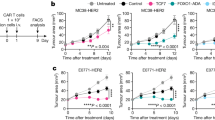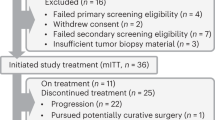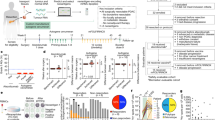Abstract
Because many tumors have mutated p53, one potential strategy proposed for cancer gene therapy is the introduction of the wild-type p53 gene into tumor cells. One puzzling aspect of this approach is that currently available gene transfer protocols result in a small percentage of tumor cells being transduced in vivo, thus implicating a “bystander effect” to achieve therapeutic efficacy. Because bystander effects in the context of p53-mediated gene therapy have not been well characterized, we evaluated the role of in vitro and in vivo bystander effects of adenovirally delivered p53 (AdWTp53). Using human tumor cell lines that did not express p53 protein but were infectible with adenovirus and showed sensitivity to p53-mediated apoptosis, we were unable to demonstrate an AdWTp53-mediated in vitro bystander effect, despite seeing strong bystander effects when cells were infected with an adenovirus containing the suicide gene herpes simplex virus thymidine kinase and treated with ganciclovir. In contrast, in vivo flank mixing studies using one of these cell lines showed a weak but significant p53-mediated bystander effect (a 40% inhibition of tumor growth). This bystander effect translated into a small survival advantage in an established intraperitoneal tumor model when tumor burden was low at the time of viral instillation. The survival advantage was lost, however, when tumor burden was increased. This study indicates that treatment of human tumors using AdWTp53 may be possible; however, because of the weak bystander effect in vivo, effective treatment will likely require a large percentage of tumor cells to be transduced.
This is a preview of subscription content, access via your institution
Access options
Subscribe to this journal
Receive 12 print issues and online access
$259.00 per year
only $21.58 per issue
Buy this article
- Purchase on Springer Link
- Instant access to full article PDF
Prices may be subject to local taxes which are calculated during checkout
Similar content being viewed by others
Author information
Authors and Affiliations
Corresponding author
Rights and permissions
About this article
Cite this article
Rizk, N., Chang, M., El Kouri, C. et al. The evaluation of adenoviral p53-mediated bystander effect in gene therapy of cancer. Cancer Gene Ther 6, 291–301 (1999). https://doi.org/10.1038/sj.cgt.7700059
Received:
Accepted:
Published:
Issue Date:
DOI: https://doi.org/10.1038/sj.cgt.7700059
Keywords
This article is cited by
-
Enhanced apoptosis of glioma cell lines is achieved by co-delivering FasL-GFP and TRAIL with a complex Ad5 vector
Cancer Gene Therapy (2003)
-
Strategies for reversing drug resistance
Oncogene (2003)
-
Downmodulation of bFGF-binding protein expression following restoration of p53 function
Cancer Gene Therapy (2001)



